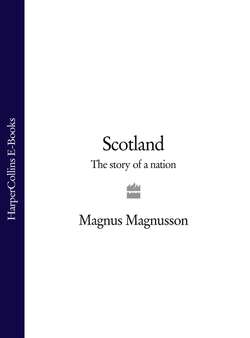Читать книгу Scotland: The Story of a Nation - Magnus Magnusson - Страница 29
The origin myth of ‘the Scots’
ОглавлениеYour identity, both as an individual and as part of a nation, is crucially determined by where you believe you come from – what your origins are, in effect. There comes a time in the growth of any country when it is both politic and imperative to have a respectable pedigree as a nation. And if you don’t know it, you invent it.
But how and when, in the case of Scotland, was it done? On what basis was this embryonic origin myth manufactured? Dauvit Brown, a lecturer in Scottish History at the University of Glasgow, has made an exhaustive study of early medieval written sources:
The earliest surviving text which propounds the idea, in all seriousness, of Scotland being two thousand years old was written during the 1290s, during the ill-fated reign of John Balliol [see Chapter 9]. It is basically a king-list, but it also includes an account of Scottish origins, explaining that the original Scots were descended from Gaedel Glas and Scota, and came from Egypt and eventually ended up in Scotland. The length of reigns in the king-list, we are told, added up to 1,976 years to the coronation of John Balliol in 1292.
The way it was achieved was by an ingenious and simple use of the available material. There was a list of kings from Kenneth mac Alpin. There was also a list of about thirty kings from Fergus Mór mac Eirc, the alleged founder of the ‘Scottish’ colony of Dalriada around the year 500. There was also a list of sixty-five-plus Pictish kings. All this material was stitched together and presented as if it were a single series of kings, which totalled 113 (once you had included Robert Bruce).
It is noticeable that this text, elaborating in this rudimentary way the idea that Scotland was an ancient kingdom, was written when Edward I [of England] was knocking on Scotland’s door with a vengeance. This Irish identity gave the kingship of Scotland the authenticity of age which medieval institutions required, through a royal genealogy stretching all the way back to Noah via the Irish king-lists.
Any desire to express Scottish identity as a form of ethnicity has an inherent weakness: there is not any one set of ‘people’ who form the backbone of a group which can be identified as modern Scots. Even in the tenth century this was so, and notions of Scottish ethnicity had to be carefully blended into a constructed notion of Scottish nationality. In the twentieth century, too, the range of peoples and cultures one might mix together when trying to construct a notion of Scottish national identity or national characteristics is as broad as ever. But the one culture still in existence today in Scotland, and the one with the longest track record, is that of the Gaels, who have the strongest claim to being the indigenous people of Scotland.
And that raises a puzzle concerning Walter Scott’s Tales of a Grandfather: the Celts, these Irish progenitors, were given no mention at all in the opening chapter, and very little mention, indeed, throughout the whole book. Why? Alex Woolf, lecturer in Scottish and Celtic History at Edinburgh University, says:
When I first read Tales of a Grandfather, what struck me most was that Scott completely passes over the Irish origin of the Scots; he makes it look as if the Scoti were indigenous people alongside the Picts from earliest times. To understand this attitude, we have to look at the period in which Scott is writing – the beginning of the nineteenth century. He grew up in the eighteenth century, when Catholicism was outlawed in the United Kingdom. There was a great anxiety about Catholicism in Britain and Ireland, and the period in which Scott was writing saw a powerful political movement demanding Catholic emancipation, which came in 1829, towards the end of Scott’s career as a writer. There was much anxiety, particularly in Ireland, about this upswelling of political fervour of a people who were ‘not like us’ – people who were not Protestants, people who still spoke Gaelic (which was totally alien to the ruling élites of both Scotland and England and, indeed, of Ireland). I think it was this linkage of Ireland with the threat of Popery which probably led Scott to feel somewhat ashamed of his Irish antecedents himself.
Ted Cowan agrees:
Walter Scott really fudged this whole issue of the Irish origins of the Scots: it did not particularly suit a Protestant Scot to make a big deal of the fact that the Scots came from Ireland, so he tended to play it down. But it is rather surprising because, in other contexts, Scott was very interested in Scottish myth and legend (and did a good deal himself to add to that myth and legend).
It is in line with his silence over the Irish connection that Sir Walter Scott makes no mention at all of Ted Cowan’s candidate for the first real king of the embryo realm of Scotland – Constantin II.
